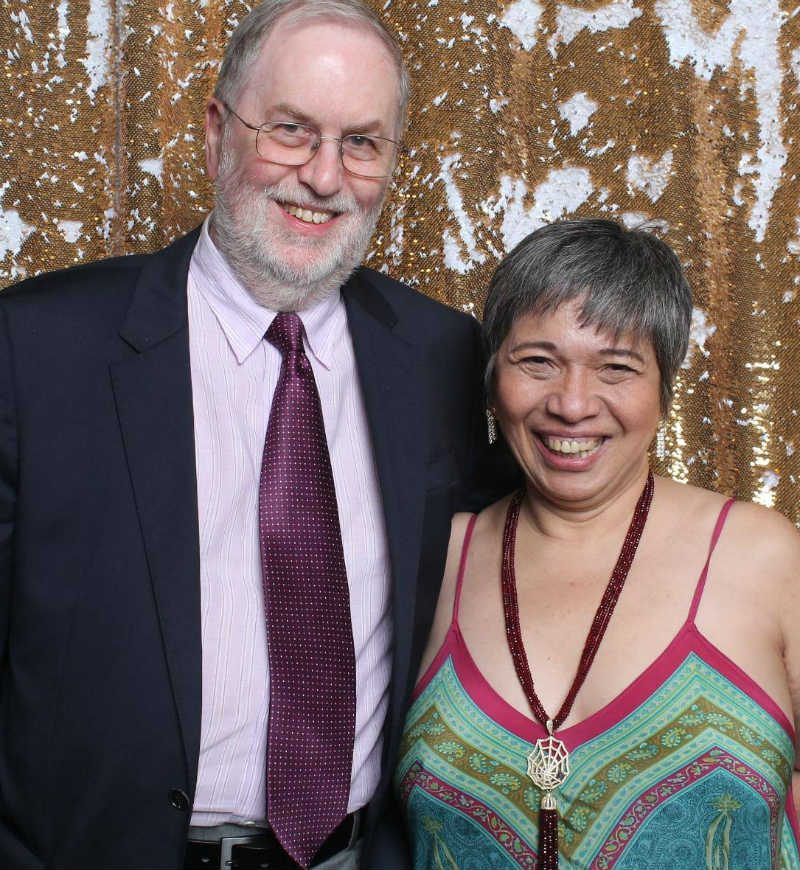SUMMARY
This is AI generated summarization, which may have errors. For context, always refer to the full article.
![[Two Pronged] My in-laws want me and my baby to be Catholic](https://www.rappler.com/tachyon/r3-assets/612F469A6EA84F6BAE882D2B94A4B421/img/29937A1D9D1B4D129616A2AD1A03BFCE/two-pronged.jpg)

Rappler’s Life and Style section runs an advice column by couple Jeremy Baer and clinical psychologist Dr Margarita Holmes.
Jeremy has a master’s degree in law from Oxford University. A banker of 37 years who worked in 3 continents, he has been training with Dr Holmes for the last 10 years as co-lecturer and, occasionally, as co-therapist, especially with clients whose financial concerns intrude into their daily lives
Together, they have written two books: Love Triangles: Understanding the Macho-Mistress Mentality and Imported Love: Filipino-Foreign Liaisons.
—
Dear Dr Holmes and Mr Baer,
I’m five months pregnant and my husband wants our baby, and of course me, to be Catholic – but something in my gut tells me I shouldn’t.
My Catholic mom was always quite liberal/secular, bringing me up that way. My dad urged her to convert to his religion, Islam; but on the basis of tradition, and not religious faith per se. (He’s not the most religious person in terms of practice; and he has expressed rather agnostic views, possibly unaware of how agnostic these views were/are.)
My father and his family have pressured me into joining Islam but I could never bring myself to do something so inauthentic to me. I’m basically agnostic.
This issue has been going on for a while. My in-laws are staunch Catholics. They have long wanted me to be Catholic because they believe in baptism for salvation. They feel that it’s a necessity so that my child and I will be “saved.” I can’t blame them since they were raised with a strict Catholic background.
I can’t stand his dad. I couldn’t believe he was willing to fabricate a birth certificate stating that I’m Roman Catholic just so our child could become Catholic too. According to hubby, he has also expressed that he would disown his children if they did not believe in God, or if they switched religions.
My husbad has two chronic illnesses which require money to treat, so getting cut out of the inheritance is a legitimate concern for him.
My hubby thinks we should just push through with my conversion and with having the child baptized but my gut says otherwise. All I know about adult baptism in the Philippines is my needing to get documents stating that I have not been baptized from FIVE DIFFERENT CHURCHES including the parish of my birthplace in Mindanao.
I feel turned off; like this sort of bureaucracy is unnecessary, considering that the whole point of religion (specifically Catholicism) is to welcome believers into a community that seeks to know and understand God.
Hubby describes himself as a non-practicing Catholic but goes to church, if his parents request that he come along. He thinks it’s a thoughtful gesture. He doesn’t really care about the baptism either and just wants to get it over with so his parents shut up and leave us alone. His argument is that he was baptized and raised a Catholic but he didn’t end up Catholic. So whether we baptize or not, our child’s religion will be a choice.
I’ve told him I feel that it would be hypocritical for me to convert to a religion I cannot wholeheartedly commit to. He understands, but also says that not everything should be taken to mean something. If we get our child baptized, it might be an empty gesture to us, but if it shuts his parents up, it would possibly earn us more freedom to do what we want.
Still, I feel like the baptism for both baby and myself is too much trouble to go through. I would much rather give my child a Christian dedication ceremony which would allow him or her to choose to become Christian later on when he or she is ready.
Having read up on the history of infant baptisms, I’ve learned that it is nowhere in the bible, and basically just a Catholic tradition initially intended to control the population (baptize a person when he/she doesn’t have a choice = more people in the church). I can’t get myself to patronize something I don’t believe in the first place.
I need an honest and unbiased view on this matter. Right now I am under a lot of stress and pressure especially now that the baby’s due date is nearing. I need help reaching a decision.
Dee
Dear Dee,
Thank you for your email.
There seem to be three main influences on you at play here: pragmatism, faith (or its absence) and what you call gut.
Your husband’s medical problems and therefore the need to safeguard his inheritance are pressuring you towards the pragmatic solution of embracing Catholicism, at least nominally. This would satisfy his staunch Catholic father who presumably controls the purse strings and should be a small price to pay if your husband’s future health is indeed at risk. Of course, your husband’s family will want to inculcate your child into the mysteries of their faith but this will not be a problem for many years to come, by which time the dynamics of your situation may be very different.
Considerations of faith however are exerting different pressures on you. Your husband is only nominally Catholic, you identify as agnostic, and the attractions of the Catholic religion have thus far eluded you.
Furthermore you have found the bureaucracy and your father in law’s suggested forgery distasteful as well. The hypocrisy of adopting a religion in which you do not believe sticks in your craw – particularly, I suspect, if it means giving in to your father in law.
Then there is your gut.
Gut feelings generally reflect short cuts to other feelings which are more difficult to unearth and analyze. As such they are very difficult if not impossible for most advice columns to deal with because they require extensive examination before an informed view can be reached. You are best placed to gauge the reliability, or otherwise, of your gut feelings and decide the extent to which it is wise to be guided by them.
As for what you should now do as the clock counts down on the birth of your child, it seems to be a straight choice between doing whatever is necessary to ensure the inheritance and secure your husband’s health on the one hand and adopting the supposed moral high ground by opposing conversion to a religion you don’t believe in and don’t want your child to adopt on the other. I would imagine that the former will prevail if you love your husband, given your lukewarm attitude to religion.
All the best
JAF Baer
Dear Dee,
Thank you very much for your letter. In the 2nd sentence of Mr Baer’s answer to you, he says: “There seem to be three main influences on you at play here: pragmatism, faith (or its absence) and what you call gut.” I would like to add another “-ism” which is the philosophy of utilitarianism and, at the risk of seeming (and, perhaps actually being) judgmental posit yet another “-ism” at play – and that is narcissism/egoism.
You seem to be most concerned about your own gut feeling. Could we reserve a discussion on this for later (hopefully after you write us another letter?)
Right now, we wish to address what seems more urgent. We hope to provide a different perspective on how you could both respond to your father-in-law’s insistence on you and your child’s getting baptized and raising him as Catholic.
However, we don’t want to leave you in a complete lurch re your kutob (gut feel) so allow us to suggest Malcolm Gladwell’s 2006 book Blink: The Power of Thinking Without Thinking and/or Richard H Thaler and Cass R Sunstein’s 2009 book Nudge: Improving Decisions About Health, Wealth and Happiness.
We would love to delve into this more deeply, adding psychoanalytic theories in addition to research so please, pleeeeease write us another letter?
Allow me to share some findings which may have bearing on your decision, even if you didn’t ask us about them. There has been a plethora of research on the effect of parents insisting on raising their kids as religious.
For example: Children and teens who are raised with religious or spiritual practices tend to have better physical and mental health as they age. People who are more religious are often happier, and people who believe in something greater than themselves are more resilient to stress.
HOWEVER, people who prayed or meditated on their own time also reaped similar benefits, PLUS lower risk of substance abuse and depression later on. There’s also a huge body of research showing what meditation itself does for the brain and for mental health, from reducing symptoms of depression to increasing attention and creativity.
But what was interesting was that it wasn’t just about how much a person went to services, but it was at least as much about how much they prayed or meditated in their own time. Those who prayed or meditated every day also had more life satisfaction, were better able to process emotions, and were more forgiving compared to those who never prayed/meditated.
In the end, I agree with Dr. John Bartkowksi, a professor of sociology at U of Texas, San Antonio who says: “It seems that raising religious children is neutral at worst, preferable at best, and probably worth the hassle of dragging the kids out of bed every Sunday.”
Let us now go to utilitarianism and how it relates to your concerns. Utilitarianism is a normative ethical theory that places the locus of right and wrong solely on the outcomes (consequences) of choosing one action/policy over other actions/policies. It moves beyond the scope of one’s own interests and takes into account the interests of others. It is an ethical theory that states that the best action is the one that maximizes utility; in this sense in terms of the well-being of (ALL) sentient entities.
Utilitarianism is a version of consequentialism, which states that the consequences of any action are the only standard of right and wrong. BUT unlike other forms of consequentialism, such as egoism and altruism, utilitarianism considers the interests of ALL beings EQUALLY.
To quote John Stuart Mill, (ALL parenthetical additions mine) “utilitarianism refers to “the Greatest Happiness Principle” – it seeks to promote the capability of achieving happiness (not just pleasure ) for the MOST amount of people.”
Mill continues: “We can distinguish egoistic utilitarianism (what do I get from this action? A greater understanding of my kutob?) from universalistic utilitarianism (what is the greatest overall utility for my husband and child?). The latter concept applies to utilitarianism qua normative ethical theory, the former is simply egoism (narcissism).”
In conclusion, as a mere “advice giver/columnist” (and not a therapist) I would strongly suggest that:
Given the research above (and much that you can find on your own), is giving in to your father in law’s ridiculous suggestion really that big an issue to you?
You do not have to raise your child the way he wants, even if he insists you all play “happy family” and go to Mass occasionally.
Given your somewhat “lukewarm attitude” towards religion and the fact that you don’t seem to strongly feel it diminishes your integrity, why not agree to your husband’s request? He is not lukewarm.
And it is clear it is not about religion per se, but going through what seems a meaningless ritual (which you can definitely treat as such). He obviously feels (as I do, given your letter) that he needs your cooperation for something as tangible as his health. In my opinion (and I emphasize the word opinion) utilitarianism qua normative ethical theory seems the better route to take at this point
Further research shows that parents who argue over religion make their children less happy. Religion can significantly worsen family relationships if it becomes a contentious issue. So it behooves you (and your husband) to make sure you are comfortable telling yourself “I can deal with my kutob later. It’s important that I do, but maybe not make it confound the present problems at this time.”
In other words, for me, Nick Offerman and Megan Mullally, TV stars known to have a happy 18-year marriage, say it best: “If you want to make your marriage a priority but you have [a] conundrum, one of you has to eat s—t,” he said, explaining how he once made the decision to leave his carpentry shop in Los Angeles to follow Mullally to New York. “…AND you can’t resent it.”
All the best,
MG Holmes
– Rappler.com
Need advice from our Two Pronged duo? Email twopronged@rappler.com with subject heading TWO PRONGED. Unfortunately, the volume of correspondence precludes a personal response.
Add a comment
How does this make you feel?





There are no comments yet. Add your comment to start the conversation.